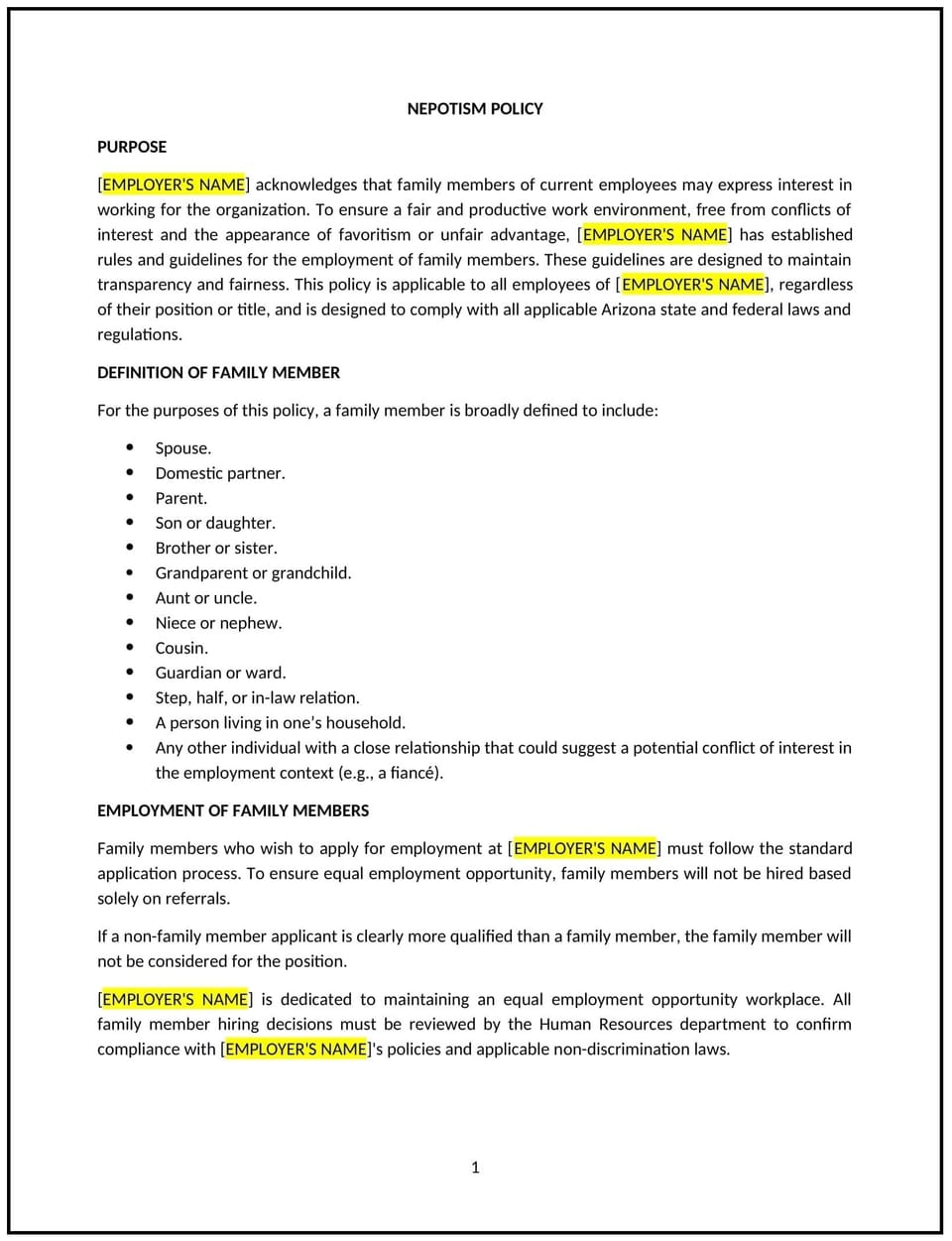Nepotism policy (Arizona): Free template

Nepotism policy (Arizona)
In Arizona, a nepotism policy establishes clear guidelines to prevent conflicts of interest, favoritism, or perceived unfairness arising from employment relationships involving family members. This policy ensures workplace decisions are based on merit and supports compliance with anti-discrimination and ethical workplace standards.
This policy outlines restrictions on hiring, supervision, and employment practices related to relatives. By implementing this policy, Arizona businesses can promote fairness, maintain trust, and protect workplace integrity.
How to use this nepotism policy (Arizona)
- Define family relationships: Specify which relationships are covered under the policy, such as spouses, siblings, parents, children, or in-laws.
- Restrict direct supervision: Prohibit family members from being in positions where one directly supervises or evaluates the other.
- Address hiring practices: Include guidelines for hiring family members to ensure they go through the same competitive process as other candidates.
- Prevent conflicts of interest: Outline procedures for managing situations where family relationships could influence business decisions.
- Include disclosure requirements: Require employees to disclose familial relationships to HR or management during the hiring process or when such relationships arise.
Benefits of using a nepotism policy (Arizona)
This policy offers several advantages for Arizona businesses:
- Promotes fairness: Ensures employment decisions are made based on qualifications and performance rather than personal relationships.
- Reduces conflicts of interest: Prevents situations where family ties could influence workplace decisions.
- Supports compliance: Aligns with Arizona labor laws and ethical workplace practices, minimizing legal risks.
- Enhances trust: Reinforces a culture of transparency and equity among employees.
- Protects workplace harmony: Mitigates perceptions of favoritism or bias that could harm morale or team dynamics.
Tips for using a nepotism policy (Arizona)
- Address Arizona-specific considerations: Reflect any state-specific industry practices or legal requirements regarding hiring and employment standards.
- Train managers: Equip supervisors with the knowledge to identify and address potential nepotism-related issues effectively.
- Use consistent hiring practices: Ensure all candidates, including family members, are evaluated through the same process to maintain fairness.
- Document decisions: Maintain thorough records of hiring and supervision decisions to demonstrate compliance with the policy.
- Review periodically: Update the policy to reflect changes in laws, workplace dynamics, or best practices.
Q: What relationships are covered under this policy?
A: The policy typically includes close relatives such as spouses, siblings, parents, children, and in-laws but may be expanded to include other familial ties.
Q: Can family members work in the same company?
A: Yes, family members may work in the same company, but they cannot have direct supervisory or evaluative relationships, and all hiring must follow standard procedures.
Q: How should employees disclose familial relationships?
A: Employees must notify HR or management of any familial relationships during the hiring process or if such relationships arise during employment.
Q: What steps are taken to avoid conflicts of interest?
A: The policy restricts family members from supervising or influencing each other’s work and outlines procedures for managing potential conflicts.
Q: How does this policy support compliance with Arizona laws?
A: The policy aligns with Arizona’s employment laws and ethical standards to ensure workplace decisions are fair, transparent, and legally compliant.
This article contains general legal information and does not contain legal advice. Cobrief is not a law firm or a substitute for an attorney or law firm. The law is complex and changes often. For legal advice, please ask a lawyer.


